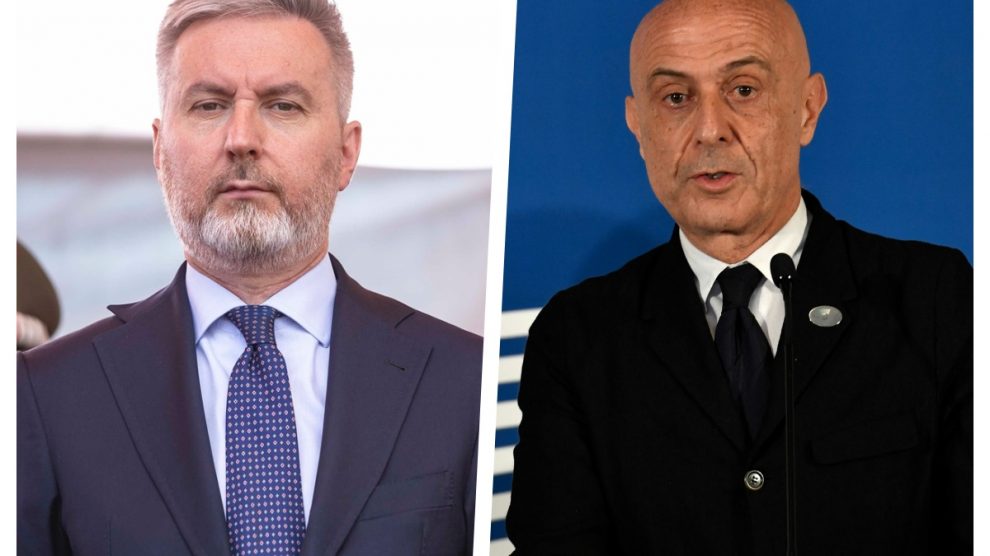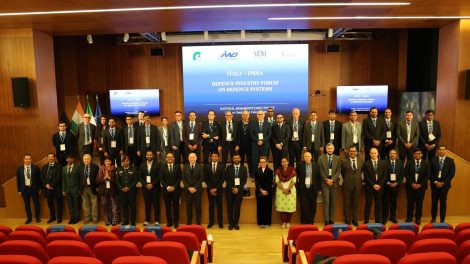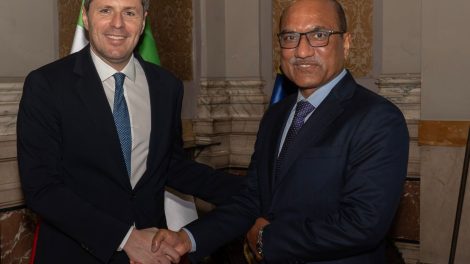Rome is grappling with the events in Ukraine, where the Kremlin’s troops are pouting through the border. During a Senate address on Wednesday, the Italian Foreign Minister Luigi Di Maio condemned Russia’s “decision to send troops with self-styled peacekeeping functions.” He then ruled out further bilateral meetings with Russian leaders until “there are signs of an easing of tensions.” This stance, he remarked, had been taken in the last hours alongside European partners and allies.
President Minniti (MedOr) on the duty of democracies
“Yesterday, [Vladimir] Putin’s Russia achieved a clear tactical success. The objective of every strategy of tension and pressure is to progressively shift the boundaries of what is possible and permitted, whilst reducing the price to be paid. With the unilateral recognition of Donbass, Russia has shifted its borders by hundreds of kilometres.”
Thus wrote Marco Minniti, president of the Med-Or Foundation and former Italian Interior Minister, in Wednesday’s Repubblica. His op-ed sought to take stock of the latest developments, as the Russian army begins its invasion of Ukraine, and analyse them to identify a way forward for Western partners.
The feeling onlookers got, he continued, was that of witnessing a pre-written Russian playbook. The military deployment on the border with Ukraine; the manoeuvres in Belarus; the opening of diplomatic channels to attempt widening the rifts in the adverse front while buying time; the meeting tables, lengthened and shortened according to the political harmony with the interlocutors. Then, yesterday, the coup de théâtre during the UN Security Council meeting, “a scene studied in the smallest details that highlighted the detachment, the quasi-loneliness of the ‘last decision-maker’.”
Now, however, after his speech to the Nation, Mr Putin’s neo-imperialist aims are for all to see. According to Mr Minniti, his North Star is a new brand of “imperialist nationalism”. This is true for Ukraine as well as elsewhere – the Mediterranean, Syria, Libya, Central Africa and the Sahel. It all adds up to “an unprecedented challenge […] that must be faced with firmness and determination by the great Western democracies.”
The Kremlin is not – nor must it be – the only author of this playbook, argues the former minister. “Ukraine cannot, must not be left alone,” and the strength and coordination by which like-minded countries reacted suggest that the lesson has been learned. From now on, “the tightness and implementation of sanctions, including individual ones,” will be decisive. History has shown that a tactical success can quickly become a dramatic gamble, and then be reversed.
Defence Minister Guerini on the Italian line
Wednesday’s papers also brought about the Italian head of Defence’s words, via an interview with the Corriere della Sera. Minister Lorenzo Guerini began condemning the violation of Ukraine’s territorial integrity and noting that Russia’s recognition of the separatist regions of Donetsk and Lugansk “violates the Minsk agreements and jeopardises efforts to resolve the conflict.”
“NATO and the EU have worked and continue to work tirelessly for a political solution. For days we have waited for Russian words on de-escalation to be followed by deeds. The facts, unfortunately, went in the opposite direction.” Thus, while Italy continues to believe that the diplomatic route is the right way, it also believes in the need for a firm response, he added.
That response, he continued, is all about cohesion with allies. Both at the EU level, with sanctions, and at the NATO level, by “maintaining the instruments of deterrence” – to which Italy contributes significantly though its assets in Latvia, Romania, the Med and elsewhere.
This is what deterrence is all about, explained Mr Guerini: “urging Russia not to fuel the conflict and to choose the path of diplomacy […] We continue to ask Russia to take a step back and commit itself in good faith to contribute to a political-diplomatic solution. In the conviction that, despite proclaimed imperial nostalgia, an escalation of the situation is not useful to anyone, first and foremost to Russia.”
The official noted that NATO remained a defensive organisation, bent on pursuing the path of politics and avoiding the use of its military might. The EU reasons along the same lines – but that’s not the same as standing and watching, he underscored: the memory of what happened with Georgia and Crimea informs the strategy of a cohesive response. “Sanctions must be real and really effective, and the decisions taken yesterday go in this direction.”
Then Minister Guerini sought to dispel doubts about Rome’s resolve on sanctions, which – as Prime Minister Mario Draghi noted – would hurt Italy especially hard due to its reliance on (Russian) gas. “There is no hesitation on Italy’s part. On the contrary, there is full adherence to the choices that at European level we are helping to make all together, at the European level,” he remarked. “Of course, energy is an important issue for citizens and is rightly considered with the utmost attention by us and our partners, but this is certainly not a brake on the firmness with which we must tackle this crisis.”
In answering the final question, he stated that the EU was not suffering from want of a proper military policy, because European cohesion “has manifested itself in the choices shared together in the Atlantic Alliance. We are working on the ‘Strategic Compass’ to which Italy is also making an important contribution. This is not just a discussion about numbers and assets on the ground.”
The EU needs to strengthen its common foreign and defence policy, he continued, starting with shared threat analysis, a common agenda, strengthening the industrial base and, finally, building military capabilities and having the will to deploy them. “As you can see, it is all about politics.”





